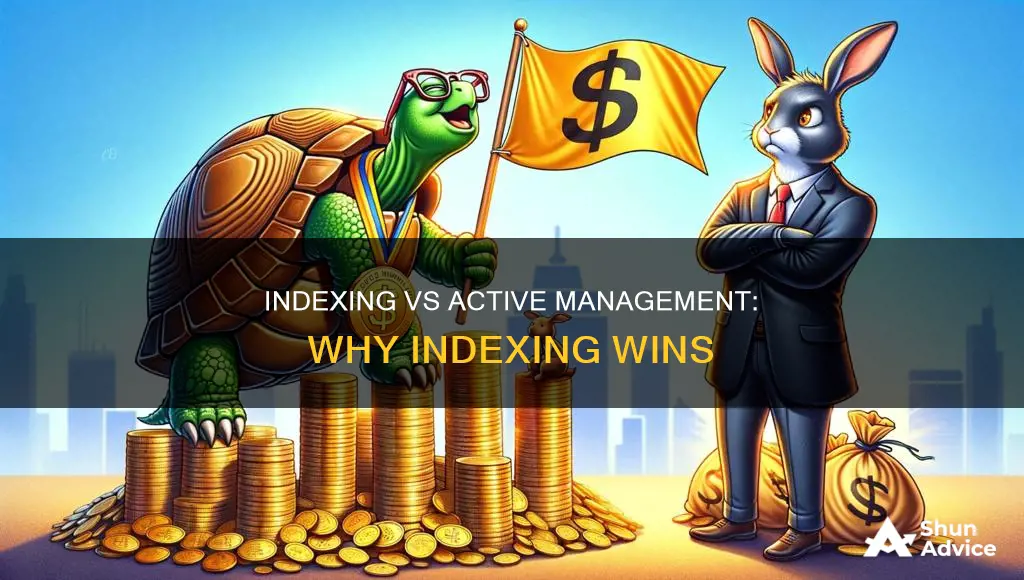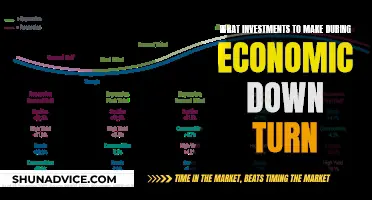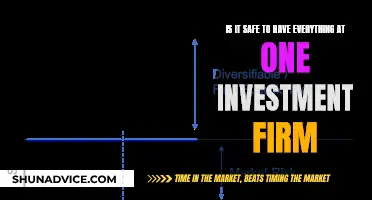
Index funds and actively managed funds are two popular investment options that allow investors to acquire an ownership interest in a large and typically well-diversified basket of securities with a single purchase. The choice between the two comes down to how much risk an investor is willing to take for the possibility of higher performance. Index funds are managed minimally, with managers seeking only to track the performance of a securities index. On the other hand, actively managed funds are overseen by a fund manager who is responsible for choosing specific securities to buy and sell, with the goal of using research and analysis to make decisions that generate superior returns. While actively managed funds offer the potential for higher returns, they also carry higher costs and the risk of underperformance relative to the market. Index funds, on the other hand, offer lower costs and stable returns but may not provide the same opportunity for outperformance.
| Characteristics | Values |
|---|---|
| Risk | Index funds are designed to keep pace with market returns, whereas actively managed funds try to beat market returns. |
| Management Style | Actively managed funds are overseen by a fund manager who chooses specific securities to buy and sell. Index funds are managed minimally, with managers seeking only to track the performance of a securities index. |
| Investment Objective | Actively managed funds aim to beat the market. Index funds seek to mirror the performance of a specific index. |
| Cost | Actively managed funds are generally more expensive than index funds. |
| Tax Efficiency | Index funds tend to be more tax-efficient because they trade less frequently. |
| Returns | Actively managed funds aim for higher returns but may underperform. Index funds offer consistent, predictable returns. |
| Flexibility | Actively managed funds can adjust holdings based on market conditions. Index funds offer limited flexibility as managers are restricted to owning shares of companies that are members of the underlying index. |
What You'll Learn

Index funds are passively managed, requiring less research and trading
Index funds are passively managed, meaning they require less research and trading. This passive management approach involves tracking the performance of a specific market index, such as the S&P 500, and aims to mirror its composition and returns. The fund managers of index funds do not actively select securities or time the market. Instead, they buy and hold securities for extended periods, with relatively little buying and selling. This results in lower expenses and fees compared to actively managed funds.
The passive nature of index funds means they require minimal management. Fund managers of index funds do not need to conduct extensive research or employ large teams of analysts and stock pickers. As a result, index funds have lower expense ratios and incur much lower costs. They trade holdings less frequently, reducing transaction fees and commissions. This passive approach also leads to fewer taxable capital gains distributions, making index funds more tax-efficient.
Index funds' passive strategy provides broad market exposure and diversification. By tracking broad market indexes, investors gain instant diversification, reducing overall portfolio risk. Index funds typically hold securities across various sectors and asset classes, providing investors with a well-diversified portfolio. This diversification helps to minimise tracking errors, or the difference between the fund's performance and its target index.
While index funds are passively managed, it is important to note that they are not completely static. The portfolios of index funds do change when their benchmark indexes change. If the fund follows a weighted index, its managers may periodically rebalance the weights and components of the securities to match the target index. This ensures that the fund continues to accurately track the performance of the specific market index.
In summary, index funds are passively managed, requiring less research and trading compared to actively managed funds. This passive approach results in lower costs, fees, and taxes for investors, while also providing broad market diversification and relatively stable returns. The passive management of index funds involves tracking and mirroring the performance of specific market indexes, with minimal buying and selling of securities.
Smart Strategies to Organize Your Investment Portfolio
You may want to see also

Index funds have lower expense ratios and fewer fees
Actively managed funds, on the other hand, have large staffs and conduct trades with more volume and complexity, driving up costs. The average actively managed stock fund incurs annual expenses of about 1.3%, or $1.30 for every $100 an investor has in the fund. This means the manager must beat the market's performance by 1.3 percentage points just to break even.
In contrast, most index funds have expenses below 0.2% a year, and many charge less than half of that. If the market returned 8%, investors in an index fund would enjoy returns of 7.8% to 7.9%, while investors in an actively managed fund would be left with just 6.7%.
Index funds are also more tax-efficient than actively managed funds. Because they trade less frequently, they distribute fewer taxable capital gains. Actively managed funds, on the other hand, may trade more often, making them more tax-efficient to hold in IRAs.
Overall, the lower fees and expenses associated with index funds make them a more cost-effective option for investors.
Building a Wine Investment Portfolio: A Beginner's Guide
You may want to see also

Actively managed funds have higher management fees
Actively managed funds are overseen by a fund manager who is responsible for choosing specific securities to buy and sell. The manager's goal is to use research and analysis to make decisions that generate superior returns. These funds often specialize in certain areas, such as small-cap stocks or international markets.
Because they are actively managed, these funds can adjust their holdings based on market conditions, which can potentially allow them to outperform the market. However, this active management comes at a cost. Actively managed funds generally have higher management fees than index funds. Investors must absorb these higher costs to pay for the managers' work.
The average actively managed stock fund, for example, incurs annual expenses of about 1.3%, or $1.30 for every $100 an investor has in the fund. This means that the manager must beat the market's performance by 1.3 percentage points per year just to break even. If the market returned 8%, the fund would have to return 9.3%, a very large margin to achieve year after year.
In contrast, index funds are managed minimally, with managers seeking only to track the performance of a securities index. They tend to hold securities for extended periods, with relatively little buying and selling. This passive investing approach results in lower expense ratios for index funds compared to actively managed funds.
Actively managed funds may be attractive to investors who are willing to pay higher fees and put more time into monitoring the performance of the fund and its managers. However, it is important to consider that despite managers' best efforts, many actively managed funds do not consistently outperform, leading to unpredictable returns.
Understanding Investment Fees: Are They Deductible on Form 5227?
You may want to see also

Actively managed funds have higher capital gains tax
Actively managed funds are associated with higher capital gains tax for a number of reasons. Firstly, they are actively managed by a fund manager who is responsible for choosing specific securities to buy and sell. This means that the fund manager is constantly re-balancing the fund by selling securities to accommodate shareholder redemptions or to re-allocate assets. The sale of securities within the fund creates capital gains for the shareholders, even for those who may have an unrealized loss on the overall fund investment. This results in higher taxable events and, consequently, higher capital gains tax.
In contrast, index funds, which are the alternative to actively managed funds, are managed minimally and seek only to track the performance of a securities index. They tend to hold securities for extended periods, with relatively little buying and selling, resulting in fewer taxable events and, therefore, lower capital gains tax.
Additionally, actively managed funds often carry higher costs to pay for the managers' work, and despite their best efforts, many do not consistently outperform, leading to unpredictable returns. Actively managed funds also have higher expense ratios due to the need for more research and the higher frequency of trading.
Furthermore, the performance of actively managed funds depends on the manager's skill and strategy, which may falter and cause returns to suffer. On the other hand, index funds offer stable and consistent returns over long periods, making them more tax-efficient than actively managed funds.
In summary, actively managed funds have higher capital gains tax due to the frequent trading and re-balancing of the fund by the fund manager, resulting in more taxable events. Index funds, on the other hand, have lower capital gains tax due to their passive nature and lower expense ratios.
Saving and Investment: Synergistic Strategies for Financial Growth
You may want to see also

Index funds are more stable and predictable
Index funds tend to have lower expense ratios than actively managed funds because they require comparatively little research and trade relatively infrequently. Many index funds track broad indexes, so investors gain instant diversification by purchasing shares in them, reducing overall portfolio risk.
Index funds also tend to produce consistent, predictable returns over long periods. The idea behind an index fund is that it will closely track its benchmark to mirror performance. Index funds can offer stable returns over time when they perform in tandem with their respective indices.
Actively managed funds, on the other hand, carry more risk because they aim to beat the market through skillful securities selection. The performance of these funds depends on the manager's skill and strategy, and if either falters, returns are likely to suffer. Actively managed funds also tend to have higher costs because of the work involved.
Partnership Investment Strategies: Portfolios Over $10 Million
You may want to see also
Frequently asked questions
Actively managed funds rely on a team of live portfolio managers, while index funds simply track or mirror a relevant index using an algorithm. Actively managed funds are overseen by a fund manager responsible for choosing specific securities to buy and sell, while index funds are managed minimally, with managers seeking only to track the performance of a securities index.
Index funds tend to have lower expense ratios than many funds because they require comparatively little research and trade relatively infrequently. Index funds can make diversifying easier through exposure to multiple securities that represent a specific index. They also tend to produce consistent, predictable returns over long periods.
Index funds offer limited flexibility, as managers are restricted to owning shares of companies that are members of the underlying index. They can do little to respond to market changes or exploit opportunities represented by individual stocks. Index funds are unlikely to outperform the market and, in fact, typically slightly underperform the index they track due to the small but still real costs involved in running the fund.







